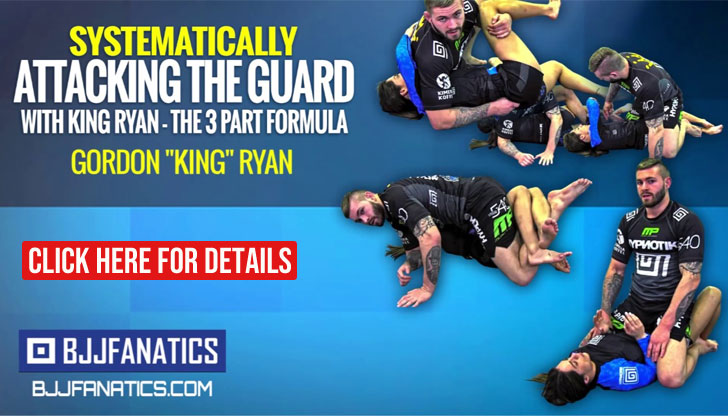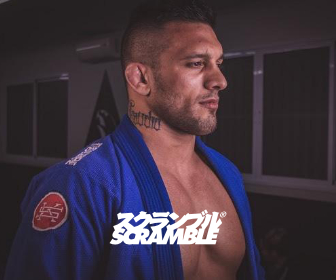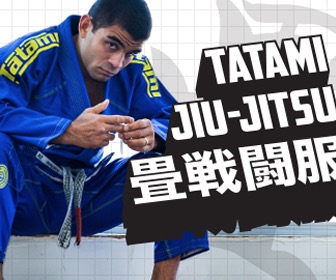Often referred to as the “human-chess game”, jiu-jitsu combines physical prowess with intricate positional combinations which require quick problem-solving skills and a strong degree of tactical knowledge. A combination of power, skill, and mental acumen.
Over the years, research has found (check here for reference 1, and here for reference 2) that the brain doesn’t fully develop until the age of 25 and that men traditionally achieve peak muscle mass somewhere between the age of 20 and 30. How this translates to BJJ is still an untested territory and something we hope to shed some light on in this piece.
Although the purpose of this exercise is to find the average age of optimal physical maturity in grapplers and possibly its cut-off point, it is important to reference that different people develop at different rates and that this is by no means the End All Be All on this subject.
When addressing the topic we decided to go through a list of all IBJJF World Championships male adult black belt medalists over the past 10 years (2011-2021 [9 events]) and try to decipher the data as this is the gold standard tournament of our sport. As per previously mentioned research, it would be logical to assume that jiu-jitsu athletes would be at their best within the 25-30-year-old range, given that this is the point when mental maturity and physical prime meet. Although there is some validity to this claim, there appear to be more layers to this, otherwise simple, equation. Bet let us start with the basics:
AVERAGE MEDALIST AGE
At a first glance, when averaging the age of the 360 medals across all weight classes of the male adult black belt category of the International Brazilian Jiu-Jitsu Federation (IBJJF) World Championships, the average age of 26.9 years of age does appear to fall well within the ranges of the aforementioned scientific studies. A consistency that also rings true when addressing these Medalist Averages Year By Year (chart).
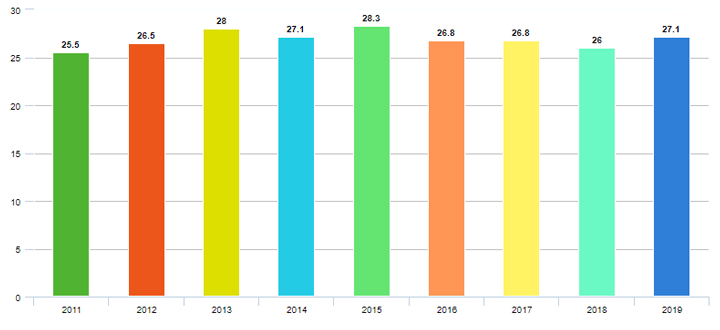
This age Sweet-Spot keeps ringing true when assessing the average medalist age per weight class, per year. Nevertheless, it is here that the first signs of disruption emerge as we see 6 instances of discrepancies. But first the Average Medalist Age Of The Past 9 Mundial Events, Per Weight Class (see chart below).
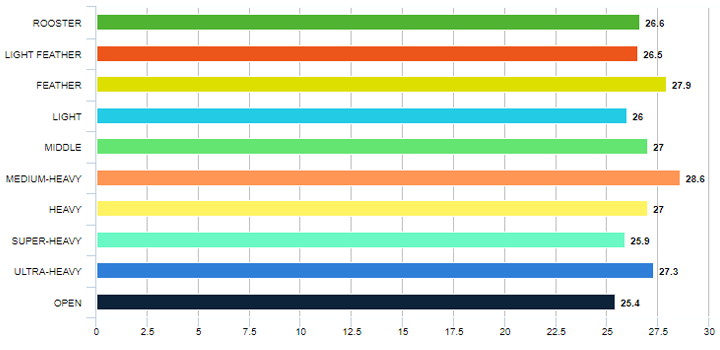
Possibly of more relevance is the fact that out of these 6 instances, only 1 was a deviation above the 30-year old range. This unusual year was 2013, a time when Romulo Barral and Braulio Estima closed the medium heavyweight bracket for Gracie Barra, leaving Atos’ veterans Guto Campos and André Galvão in 3rd place, making an average of 31-years-of-age. Never again did we see the average age of medalists of any weight class go above the 30YO mark.
On the other side of the spectrum – below the 25YO mark – we saw 6 separate instances of the occurrence. In fact, as we will demonstrate throughout this piece, jiu-jitsu’s prime-age does appear to be much closer to the bottom end of the mark.
The Outliers, Weight Classes Who Went Over Or Under The 25-30 Age Range, By Year (chart).
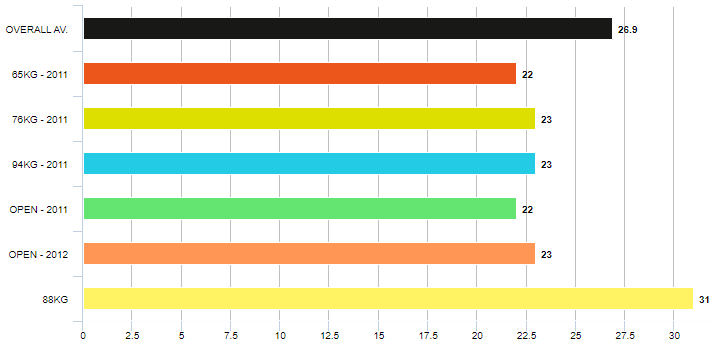
4 of those occurrences happened in one single year, 2011. A time year when jiu-jitsu’s (then) new generation emerged with excellent performances by Ary Farias, Guilherme Mendes, Rafael Mendes, Kron Gracie, Gilbert Burns, JT Torres, Rodolfo Vieira, “Cara de Sapato”, Bernardo Faria, Leo Nogueira, Marcus Buchecha, Braga Neto, to name a few. All medalists below the stated mark who contributed to this “glitch” in the light-feather, light, heavy, and open weight classes.
The only other instance under the 25YO range was the open weight division of 2012, the first year Marcus Almeida won double gold at the Mundial.
THE CHAMPIONS
When assessing the Average Age Of An IBJJF Adult Black Belt World Champion (see chart below) the results continue to prove the 25-30YO rule down to a tee. With the exceptions made in the aforementioned generational takeover of 2011 and 2012 where the average fell down to 24, every year has produced very similar numbers, and the average remains. A very similar story when addressing each weight class individually.
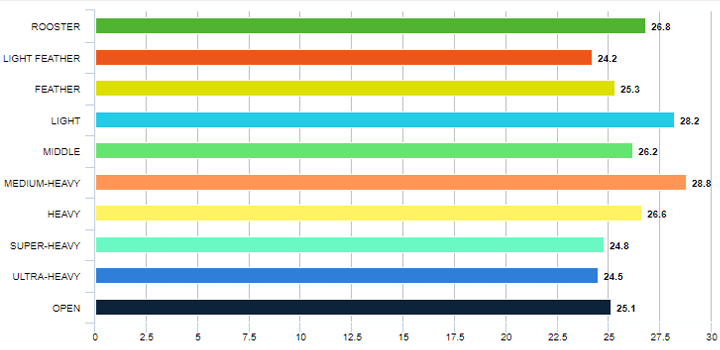
THE DEVIL IS IN THE DETAILS
Although all these aforementioned averages are verifiable, the fact that we’ve had many champions outside of this age range created, at first glance, a bit of a paradox. Overall, 9* athletes have conquered world titles when in their 30s, which is 23% of all the men who conquered gold medals during this 2011-2021 period.Their names were: Bruno Malfacine, Gabriel Moraes, Lucas Lepri, Romulo Barral, André Galvão, Alexande Ribeiro, Rubens Cobrinha, Augusto Tanquinho, Claudio Calasans, and Leandro Lo.
There are, however, caveats to these champions’ stories. Out of all these “Masters Eligible” world champions, only two conquered their FIRST world title after the 30YO mark (Augusto “Tanquinho” Mendes and Claudio Calasans), but even there, both Tanquinho and Calasans had earned medals at the World Championships when in their 20s, proving then that they were on the cusp of a gold medal. They did not break through at that later age.
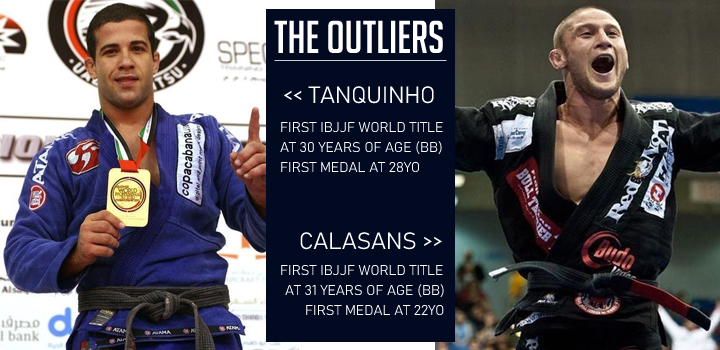
* possibly 10, above 30YO athletes, have conquered the World Championships as we could not ascertain Alexandro Ceconi’s age, the 2016 super-heavyweight gold medalist.
THE CUT-OFF POINT
Although the World Championship produced 90 gold medals during the period of this study, those medals were allocated to only 38 athletes, as many athletes such as Bruno Malfacine, Lucas Lepri, and Marcus Buchecha, dominated their weight classes for many years, taking the bulk of the medals there.
An interesting fact is that out of these 38 athletes, the average age for their FIRST world title – the age when they first established themselves as the champions of their weight classes – was the 23-year-old mark. Seldomly have we seen an athlete make his FIRST claim to the world title after his 25th birthday. The outliers here were João Miyao (28 [first silver medal at 23YO]), the aforementioned Tanquinho (30) and Calasans (31), Rubens Charles “Cobrinha” (26 [earned his black belt that year]), as well as Lucas “Hulk” Barbosa (26). A total of 5 athletes out of 38 (13%), but even here, only Augusto Tanquinho, Lucas Hulk, and Rubens Cobrinha had not medaled prior to their 25th B-day.
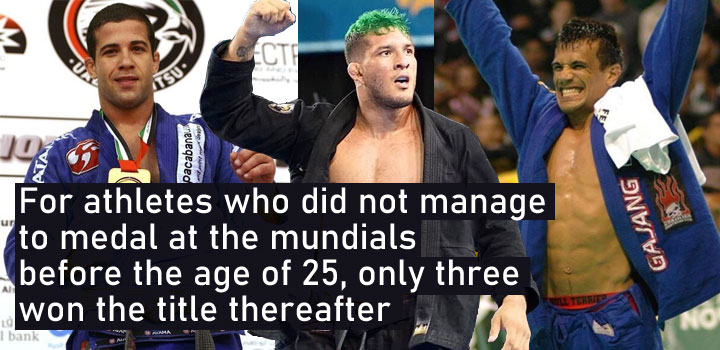
When addressing the overall first medal as an adult black belt (regardless of gold, silver, or bronze), then the age average drops even further. This leaves us to ascertain that if a jiu-jitsu athlete isn’t at the cusp of conquering his first world title by the age of 23, his chances of doing so after this mark drop dramatically.
CLOSING REMARKS
Although a range of studies has pointed towards peak physical maturity occurring at later stages of life when comparing with our jiu-jitsu analysis, other equally sobering research done with swimmers has corroborated our results (reference here) demystifying the 25-30 notion, showing a much lower peak age of 21-years-of-age for that particular sport. Jiu-jitsu’s numbers appear to be much closer to those of this latter study.
These ranges also appear to be seen across all weight classes, from Bruno Malfacine (rooster-weight) whose first world title was claimed at the age of 21, to ultra-heavyweights Marcus Almeida who won his first double at 22 or Antônio Braga Neto 20.
Cover photo by BJJ Pix.




